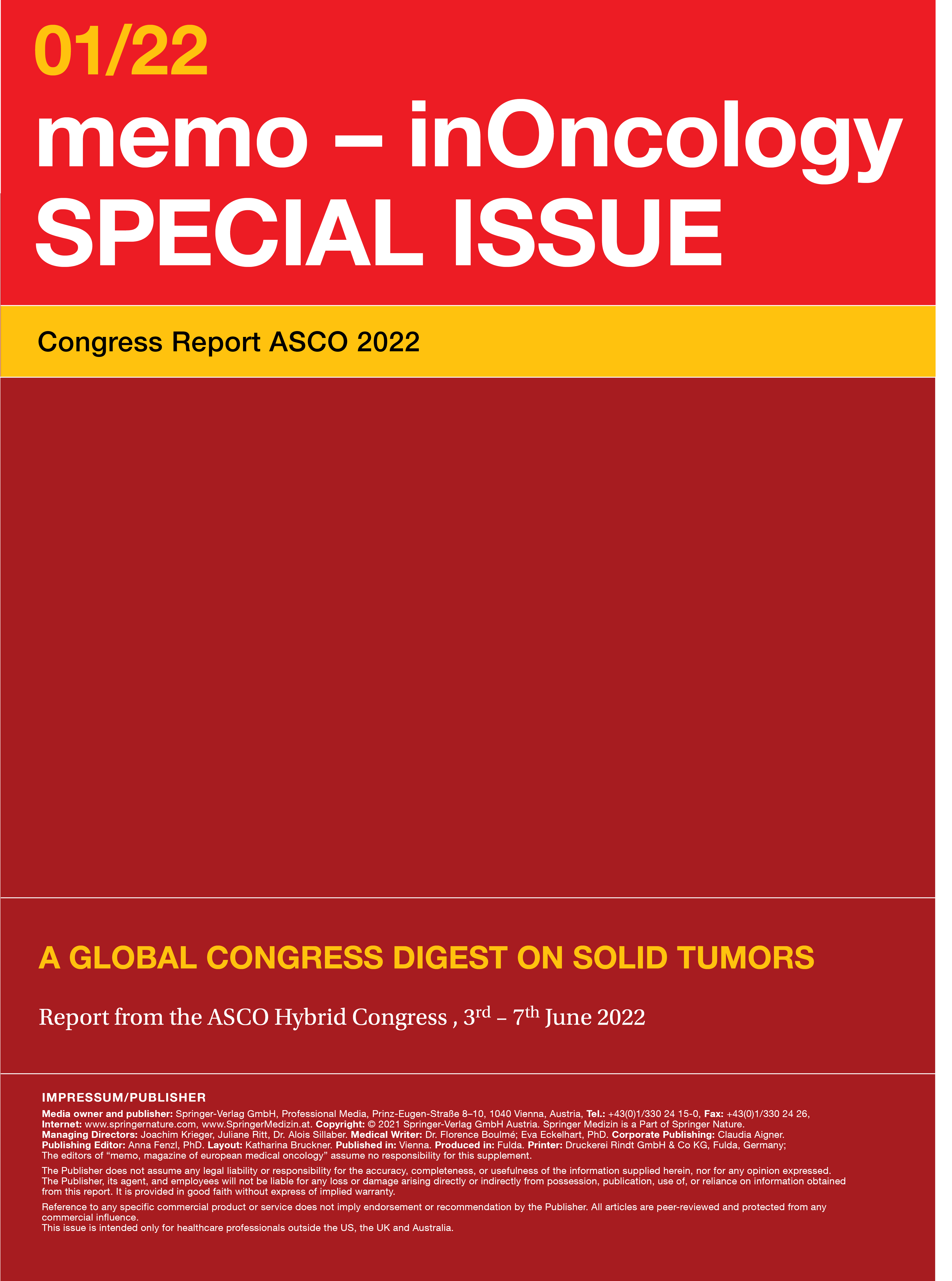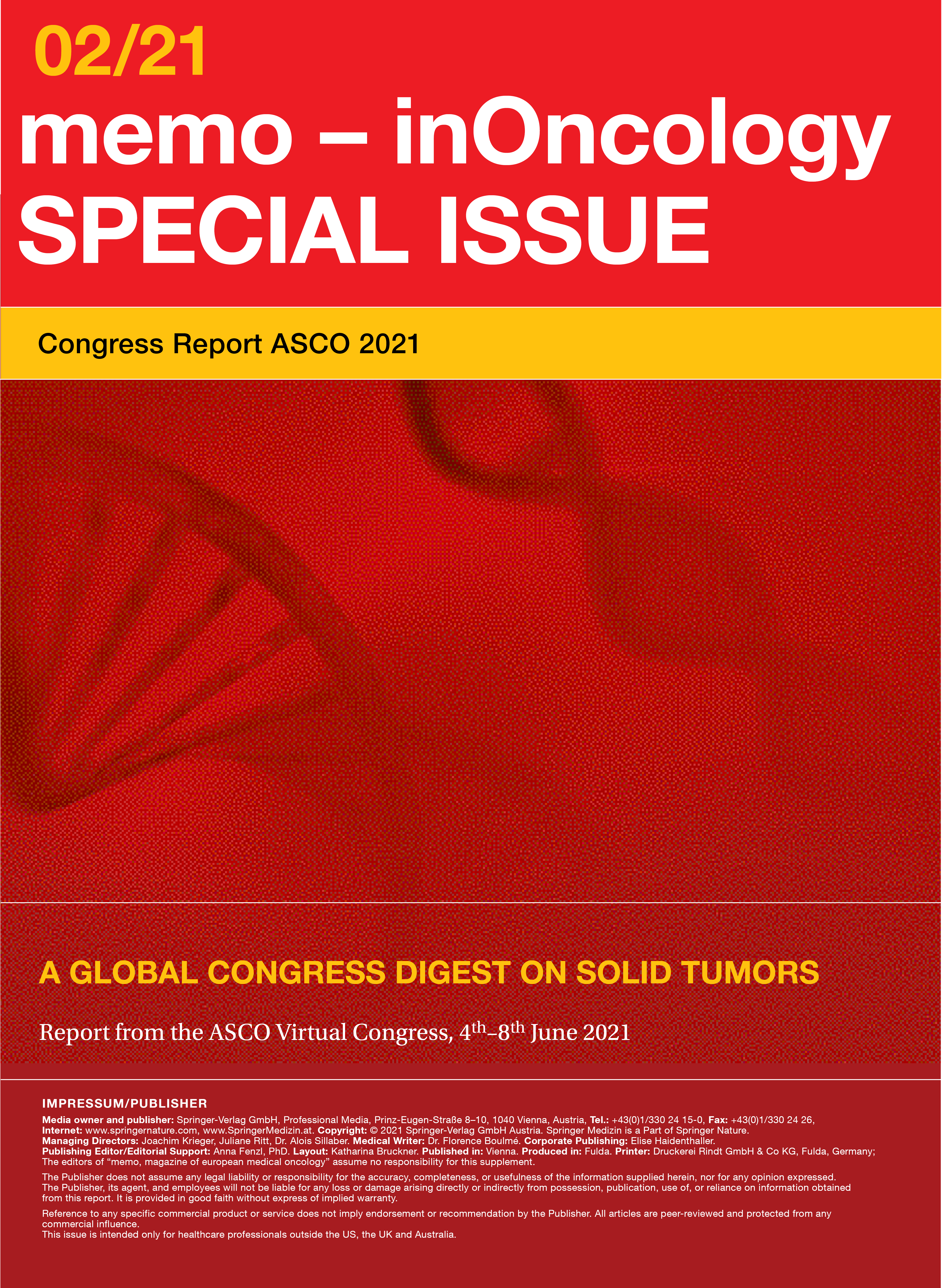ASCO Solid Tumors 2022 – hybrid, Chicago
Lecture Board: Ian Chau, MD; Chiara Cremolini, MD; Keun-Wook Lee, MD, PhD; Yunpeng Yang, MD; Li Zhang, MD
Medical Writer: Dr. Florence Boulmé
Publishing Editor: Anna Fenzl, PhD
Preface ASCO Solid Tumor 2022
Preface – ASCO Solid Tumor 2022 © Private – Keun-Wook Lee, MD, PhD, Department of Internal Medicine, Seoul National University College of Medicine, Seoul National University Bundang Hospital, Seongnam, South Korea Dear Colleagues, After 2 years of the COVID-19 pandemic, the Annual Meeting of the American Society of Clinical Oncology (ASCO), was held in Chicago, USA, and virtually from 3rd–7th June 2022.
Novel agents or combinations in recurrent or metastatic nasopharyngeal cancer
Novel agents or combinations in recurrent or metastatic nasopharyngeal cancer Nasopharyngeal cancer (NPC) is a rare malignancy with an incidence of approximately 133,000 annually worldwide, resulting in about 80,000 deaths per year [1].
Innovative combinations in esophageal squamous cell carcinoma
Innovative combinations in esophageal squamous cell carcinoma Each year, esophageal cancer (EC) is responsible for more than half a million deaths worldwide.
An update and future directions in advanced gastric or gastrointestinal junction cancer (G/GEJC)
An update and future directions in advanced gastric or gastrointestinal junction cancer (G/GEJC) With more than 1 million newly diagnosed cases in 2020, gastric cancer (GC) is the fifth most frequent cancer; it was also the third leading cause of cancer-related death worldwide [1].
New therapeutic options being currently investigated in advanced or metastatic colorectal cancer
New therapeutic options being currently investigated in advanced or metastatic colorectal cancer Anti-EGFR antibody therapy in RAS and BRAF wild-type metastatic colorectal cancer Colorectal cancer (CRC) is the second leading cause of cancer death in the United States, and it is the fourth most frequent cancer diagnosis [1].
New clinical insights in hepatocellular carcinoma
New clinical insights in hepatocellular carcinoma Hepatocellular carcinoma (HCC) affected approximately 905,000 new diagnosed cases worldwide in 2020 and showed a high mortality rate [1]. Current first-line treatment for advanced HCC includes atezolizumab plus bevacizumab [2], as well as the tyrosine kinase inhibitors sorafenib [3, 4] and lenvatinib [5]. Pembrolizumab monotherapy: updated analysis of the KEYNOTE-224 trial Previously reported data of the KEYNOTE-224 single-arm, non-random
EXPERT VIDEOS
All video interviews from ASCO Solid Tumors 2022
Kohei Shitara talks about new promising agents in the treatment of advanced HER2-positive gastric/gastroesophageal junction adenocarcinoma and how existing drugs can blend into these new regimens. He overviews the current state of prognostic and predictive biomarkers in gastric cancer and gives an outlook on new biomarkers that are on the rise to guide therapy while finally summarizing his personal medical and scientific highlights at this year’s ASCO meeting.
Anna Spreafico depicts her personal highlights regarding immunotherapy plus chemotherapy or intensity-modulated radiotherapy for people with locally advanced nasopharyngeal cancer (NPC) at this year’s ASCO meeting, discusses if longitudinal plasma EBV DNA monitoring should be incorporated into the guidance of personalized disease management and future clinical trials, highlights the most promising agents explored in the 1L treatment of recurrent/metastatic NPC and overviews how the prognosis of those patients will evolve in the years to come.
Julien Edeline highlights which clinical trials examining combination approaches are anticipated to expand the treatment armamentarium for treatment-naïve patients with unresectable HCC and which new agents are promising in the second- and third-line treatment of advanced HCC. He gives an outlook on how the prognosis of patients with advanced HCC will evolve in the years to come while focusing on the quality of life in HCC as well as the impact of systemic treatment on it.
Ian Chau summarizes the notable efficacy and safety data obtained with nivolumab plus chemotherapy or ipilimumab versus chemo as 1L treatment for advanced ESCC in the CheckMate 648 trial and explains the role of EGFR inhibitors in the treatment of ESCC, especially in combination with radiation. He focuses on the treatment paradigm in advanced/metastatic ESCC and how it might change in the near future while also explaining the barriers to implementing precision oncology in the setting of ESCC.
ASCO Solid Tumors 2021 – virtual
Lecture Board: Todd M. Bauer, MD; Zineb Belcaid, MD; Ian Chau, MD; Hyun C. Chung, MD; Thorsten O. Götze, MD; Christian Schauer, MD
Medical Writer: Florence Boulmé, PhD
Publishing Editor: Anna Fenzl, PhD
Preface ASCO Solid Tumor 2021
Preface ASCO Solid Tumor 2021 Ian Chau, MD, Department of Medicine, The Royal Marsden Hospital, Sutton, Surrey, United Kingdom Dear Colleagues, Because of the ongoing COVID-19 pandemic, this year’s ASCO scientific meeting took place for the second time virtually from Friday, June 04, through Monday, June 08.
Novel approaches in gastric cancer
Novel approaches in gastric cancer LEAP-005: lenvatinib plus pembrolizumab in gastric cancer With more than 1 million newly diagnosed cases in 2020, gastric cancer was at the fifth place (5.6 %) of the most frequent malignant diseases and accounted for nearly 8 % of cancer deaths worldwide [1].
Checkpoint inhibition: predictors, resistance and immunogenomic features
Checkpoint inhibition: predictors, resistance and immunogenomic features Predictors of immunotoxicity to checkpoint inhibitors Immune checkpoints, such as cytotoxic T-lymphocyte associated protein-4 (CTLA-4) or programmed cell death protein 1 (PD-1), downregulate T-cell responses and are crucial for self-tolerance, which protects the body against attacking cells indiscriminately [1].
PARP- and anti-PD-1-based strategies in breast and cervical cancer
PARP- and anti-PD-1-based strategies in breast and cervical cancer Talazoparib in germline BRCA1/2-mutated breast cancer … Breast cancer (BC) is the most diagnosed cancer in women and the leading cause of cancer death in females [1].
Anti-PD-1 compounds targeting MSI-H/dMMR tumors
Anti-PD-1 compounds targeting MSI-H/dMMR tumors Keynote-158: an update of pembrolizumab in MSI-H/dMMR solid tumors Accurate and timely repair of DNA is essential for maintaining genetic stability [1].
Early insights for CPI combinations in solid tumors
Early insights for CPI combinations in solid tumors Ezabenlimab combined with anti-VEGF/Ang2 inhibitor Immunotherapy using anti-PD-1 immune checkpoint inhibitors (CPIs), which is a major therapeutic option in oncology, can potentially achieve synergistic effects once combined with targeted therapies [1].
Esophageal cancer: taking immunotherapy one step further
Esophageal cancer: taking immunotherapy one step further In 2020, more than 604,000 new cases of esophageal cancer (EC) were diagnosed; EC was the sixth leading cause of cancer-related death worldwide [1].
EXPERT VIDEOS
All video interviews from ASCO Solid Tumors 2021
Peter R. Galle overviews the role of immunotherapy in the setting of hepatocellular carcinoma as well as biomarker-based patient selection and discusses which novel combinations of immune checkpoint inhibitors with other drug classes are most promising at present and how those novel strategies impact the treatment landscape.
Roberto Pazo-Cid outlines recent insights gained in terms of anti-PD-1 treatment in the setting of esophageal squamous cell carcinoma, talks about the practice-changing results obtained in the CheckMate 649 trial and the impact of PD-1 inhibition on the real-world prognosis of patients with gastric and esophageal adenocarcinoma as well as further developments regarding immune checkpoint inhibition.
A range of relevant and potentially practice-changing findings was presented in the field of lung cancer. Immunotherapy and targeted-therapy strategies are now being explored either before or after surgery for early stage disease, with multiple challenges in determining what is and is not a transformative approach. (ASCO 2020)






